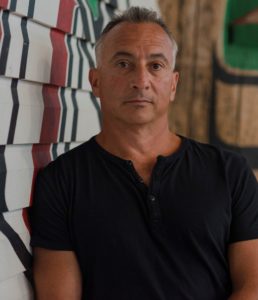Mark Marsolais-Nahwegahbow
Founder, Birch Bark Coffee
Correctional Worker – Class of 1993
Mark Marsolais-Nahwegahbow is on a mission to change Indigenous lives for the better.
A member of the Ojibway Band from Whitefish River First Nation in northern Ontario, Marsolais-Nahwegahbow is the founder of Ottawa-based Birch Bark Coffee Company, a firm that sources its fair trade, organic beans from Indigenous farmers in Central and South America. It is one of three companies in Canada that has SPP certification, indicating that the coffee is produced by small independent farmers supporting their families and communities with their product.
A portion of the proceeds from each bag of coffee that Birch Bark sells is going toward the purchase of certified water purifiers for Indigenous families in Canada. For every 100 bags sold in retail stores, or every 50 bags sold through Birch Bark’s website, one purification system is purchased. Enough has been raised to date to purchase over 100 units. Installations began on the Algonquins of Pikwàkanagàn First Nation (formerly Golden Lake First Nation, southwest of Pembroke) just before Christmas 2018.
Birch Bark was never just about coffee, Marsolais-Nahwegahbow says, it was about the health of whole communities. “Canada is one of the richest countries in the world, yet hundreds of First Nations are communities in crisis with no access to clean water. As an entrepreneur, you have a million ideas in your head, but at first I had no idea what I could do. By taking a commodity like coffee and turning it into a social enterprise, I found a way to make a difference.”
His ambitions were modest as a young man. He worked as a construction worker in Sudbury, learning skills that would serve him well in later years. But he looked for opportunities to embark on a different kind of career. “I wanted to help people. I moved to Ottawa and looked into the Correctional Worker program at Algonquin College. I thought this might be one way to do it. It turned out to be a great choice: I was a mature student and a bit rusty, but some amazing teachers inspired me and helped me with my studies.” He graduated with the Class of 1993, and today serves on the department’s Program Advisory Committee.
Marsolais-Nahwegahbow went on to spend the better part of three decades in the criminal justice system, working to reduce the overrepresentation of First Nations, Inuit and Metis people. He spent 18 years in the jail system, then — after taking a hiatus to create his own construction company —started working at the Wabano Centre for Aboriginal Health to raise the effectiveness of its reintegration programs.
Having achieved this goal, he became a native justice coordinator at the Odawa Native Friendship Centre, worked as a residential school crisis intervention counsellor for Indigenous and Northern Affairs Canada, and in 2015 founded IndiGenius & Associates, a justice consulting firm that to date has written over 200 Gladue Reports, which tell the life stories of Indigenous people in court for bail or sentencing hearings. “We were determined to bring Gladue to a whole new level. It wasn’t being done properly, and we put it on the map.”
In 2017, IndiGenius and Vancouver Community College partnered to create Canada’s first Gladue Report writing program. “I hope we’ve impacted the judicial system with our reports and will continue to do so through this intensive training program.”
He gives full credit to the people who have assisted him in his career. He says knew nothing about coffee or retail or ecommerce when he set out to create Birch Bark. But with help from his roasters at the Atlantic cooperative Just Us, Tobias Lutke at Shopify and others, he was able to launch in March 2018. “This just flew out of the gates so fast. I couldn’t have made it happen without the people who came into my circle to help.”
Today he is a popular public speaker, appearing at fundraisers for schools and congregations, at gatherings of people eager to know more about the water crisis in Canada and how they can help, and at business events where he hopes to inspire the next generation of entrepreneurs. He is heartened by the number of young people he meets with social enterprises in their sights.
“There’s a big shift happening,” Marsolais-Nahwegahbow says. “People really, truly want change. Young people want to make it happen and adults need to be seen to be preparing the path for them. I want to be part of that. I want to inspire people to give back to their communities.”